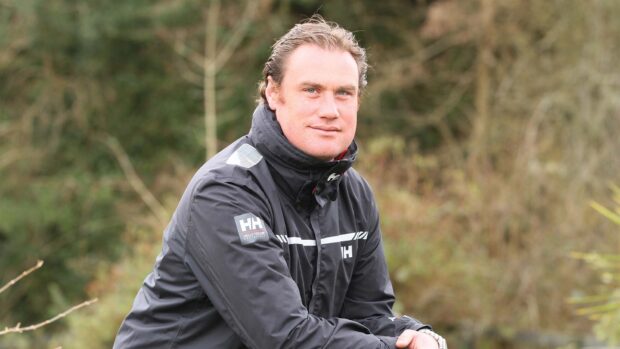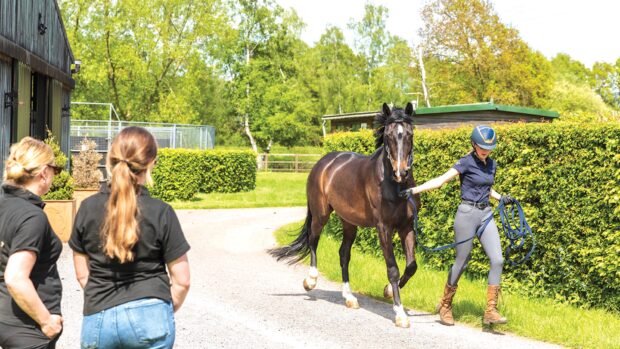You may know about syndicates from the racing world, but they’re becoming a lot more popular in other areas of equestrian sport too. There are lots of benefits to the syndicate system (if done correctly, of course), for both rider and participant.
Event rider Harriet Morris-Baumber has two syndicates with the second one starting in response to the success of the first. The idea behind the formation of the syndicate initially was to have the finances and support to buy an event horse that could compete at a higher level, but during the search it became apparent that what Harriet wanted wasn’t available.
“We saw a lot of horses and in the end we changed our plan and invested in two younger horses for the first syndicate,” she explains. “We then had other people ask to join and some of our initial syndicate wanted to be involved in a second one too, so we were able to fund another young horse through the second one.”
Shaun Mandy is a dressage rider who decided to form a syndicate with his horse Euphoria E (pictured), by Uthopia, who competes at prix st georges and Inter I and is working towards grand prix.
“At the time I needed some additional funds and selling some shares in him really helped,” says Shaun. “But one of the main reasons was to help with the running costs of a competition horse as those really do add up very quickly.”
Syndicate sizes vary as does the set-up. Harriet’s simply works by people buying different percentages of the horse/s and the monthly fee is representative of that too. Across her two syndicates she has five owners. Shaun has three owners in his syndicate and each has a 10% share in the horse and pays the same percentage of the horse’s running costs across the year as a monthly or yearly amount.
Alex Hempleman is a showjumper based in West Sussex. He has competed up to international three-star grand prix and is well-known for producing horses up through the grades. After speaking to Harriet (Morris-Baumber), he’s in the process of setting up a syndicate, but for quite a different reason.
“I feel our sport is often seen as being exclusive to the wealthy,” explains Alex. “Many people buy into showjumpers as an investment and although all sports obviously need money, to me the passion is really important too. Through the syndicate I’m putting the finishing touches to at the moment, I want to help people enjoy the sport and make it accessible to more people.”
For the rider, there are benefits over having a single owner, one being that the horse usually remains with that rider and they have overall control (depending on the contract) which can prevent issues if an injury or fall out occur. But there are other benefits too.
“Obviously the finance is big one because it means that I can train regularly and go to the competitions, which at small tour level add up,” says Shaun. “Having the support of other people is lovely too. They come to shows and training and I share everything in our WhatsApp group too.”
The support is something that, perhaps, isn’t the most obvious benefit but Harriet agrees.
“Having people to celebrate and commiserate with is really nice. I thought it would add to the pressure but it really doesn’t.”
As for the cons for professional riders, these seemed to be few and far between, and any ‘con’ is more of a management issue if the syndicate is set up correctly to start, as Harriet explains: “There aren’t really any negatives with mine for me. A potential issue could be speaking to all the owners after a competition, but we have a WhatsApp group that I use to keep everyone up-to-date. I need to allow more time to walk courses — but that’s hardly a con, it’s just a change in how I used to do it, but it’s great to have people along with me.”
Contracts and legal help are a must as there are lots of angles to consider. Things like insurance for loss of use as well as death need to be considered, what happens if the horse is sold (and the allocation of any funds), the cost of buy in and ongoing costs, and what the long term plan for the horse is and the objectives of the syndicate. Being clear and having it written up by a good solicitor could well save you a lot of stress and money in the future.
As for advice for people getting involved, Shaun has some: “You need to have a passion for the sport and enjoy it, and you’ve got to like the rider. The social aspect is a big part of our syndicate from the owners’ point of view, so making sure you enjoy that side of things is a big plus.”
“The numbers — make sure you check your numbers and ensure that everything works from a financial point of view,” says Harriet. “And think about the future too — if you have a horse you want to take to three-day events, make sure you could actually afford to take him!”
Article continues below…
You might also be interested in:

Subscribe to Horse & Hound magazine today – and enjoy unlimited website access all year round
From the other side of the syndicate, it can be great too. Natalie Bell is an equine sports therapist based in Essex and is part of a more ‘traditional’ racing syndicate.
“I always thought being a racehorse owner would cost thousands,” admits Natalie. “But when Ben Youngs (the England Rugby/Leicester Tigers player) said he wanted to create a syndicate that racing and rugby fans could get involved in, I thought I might as well enquire.
“The main ‘pro’ for me has to be that it’s relatively affordable, but being involved with a group of like-minded people who share the passions you have is such a lot of fun.”
For all the latest equestrian news and reports, don’t miss Horse & Hound magazine, out every Thursday



